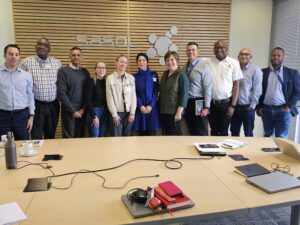
CARE-O-SENE achieves milestone in the commercialisation of sustainable aviation fuels
Researchers in the CARE-O-SENE project prove that a yield of over 80% for sustainable kerosene is achievable.
Hamburg/Berlin, 1.10.2024 – Intensive testing in the CARE-O-SENE project confirms that the new CARE-O-SENE catalysts can achieve kerosene yields in excess of 80%. This significantly improves the economic viability of power-to-liquid (PtL) processes and accelerates the commercialisation of Sustainable Aviation Fuel (SAF).
This is a significant progress in the development of more efficient catalysts for the Fischer-Tropsch process, a central step in PtL processes for the production of sustainable aviation fuels (SAF). The German-South African CARE-O-SENE consortium, which includes the Fraunhofer Institute (IKTS), the Helmholtz Centre Berlin (HZB), INERATEC, the Karlsruhe Institute of Technology (KIT), University of Cape Town (UCT) and Sasol, is making an important contribution to the goal of decarbonising aviation with this success.
Using the established Fischer-Tropsch process, green hydrogen and carbon dioxide can be converted into synthetic fuels. The catalysts developed in the CARE-O-SENE project increase the efficiency of the overall process, so that fuel production can be significantly increased while using the same resources.
The positive results from the project team's internal tests in a special laboratory in South Africa have now been confirmed by external experts from the Danish company Topsoe: ‘At our pilot plant in Denmark we have tested several product samples that Sasol produced for the CARE-O-SENE project in its semi-commercial plant in South Africa. We were able to increase the yield in kerosene production to over 80 percent,’ explains Sandra Winter-Madsen, Product Line Director from Topsoe.
‘We are pleased that we have been able to confirm the 80% yield target of the CARE-O-SENE project,’ says Tobias Sontheimer, co-project manager and head of the Strategy Department for Energy and Information at HZB. ’This is another important milestone on the road to the production of SAF suitable for mass production.’
The next step is now a scientifically sound life cycle analysis (LCA): ‘The product processing data is a crucial building block for the ongoing LCA, which we intend to use, among other things, to better quantify the positive impact of the new catalysts on the viability of PtL projects,’ explains Toine Cents, work package leader in the CARE-O-SENE project and Senior Manager Engineering Research at Sasol. ‘We expect the results of the LCA at the end of 2024.’
Further details on the current state of research in the CARE-O-SENE project and insights into how international collaboration can help to meet the challenge of decarbonising aviation can be found in the webinar: Innovate to Elevate: A CARE-O-SENE Event on International Collaboration to Decarbonise Aviation. Further information can be found at this link.
*Technical term for the effectiveness of multi-stage chemical processes
-End-
Press contact:
Torsten Titze, Communications Manager Advanced Materials, Sasol
Mobile telephone: +49 173 66 800 90
Torsten.Titze@de.sasol.com





